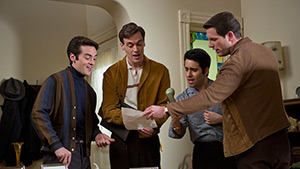Composing additional music for Jersey Boys sounds like a bit of a thankless task. The show is already a Tony Award-winning hit musical, so you know that no one is coming for your new contributions - or anyone else's for that matter (including your famous father, Clint, the director). Your work ends up essentially being the filler between classic showstoppers in a product that audience members already love. Funny, then, that your music had to do so much heavy-lifting.
Like a lot of recent Broadway productions, Jersey Boys is really a series of musical numbers strung together by a thinnest of librretos. The connective tissue, in this case, being the story of Frankie Valli and The Four Seasons. And with that, it follows the standard music biopic playbook by the numbers: we see the early scenes that establish what exactly it means to be a "Jersey Boy" (think Goodfellas by way of … let's say Newsies) followed by the forming of the band which leads to early frustrations, which then leads to success, which then leads to conflict, and so on. If this sounds a little dismissive, it's not very different than the way your dad treats those scenes - as obligations rather than integral moments that have proper build-up and resolution.
This is where you come in, Kyle. Because the important scenes aren't given the attention they need to resonate, the onus fell on you to try to give them some sort of meaning. And boy do you try. Your use of music is a testament to how flat these scenes must have played on their own. Sometimes you start the musical cues even before anything else in the film has clued us in to what we should be feeling or thinking. This was used cleverly in an early scene, though, where some of your over-the-top musical cues serve as a takeout when young Frankie falls victim to a scam.
I don't mean to imply that no one else is trying, either. All four main players - Vincent Piazza, Erich Bergen, Michael Lomenda, and especially John Lloyd Young as Frankie Valli have charisma to burn. Each actor holds their own on screen, which is especially important when there isn't much else to support them. Joseph Russo is fun, if a little obvious, as a young Joe Pesci. Even Christopher Walken does his best, basically playing a sort of human get-out-of-jail-free card. Other actors register less, but seem to be letdown by Marshall Brickman and Rick Elice's screenplay. For example, Renee Marino (as Frankie's wife Mary) goes from being streetwise and full of life to a bitter alcoholic so fast, it felt like Brickman and Elice knew where she had to get, but didn't understand why.
Thankfully, though, every major beat of the story is punctuated by a hit musical number and usually propels the story forward. These are definitely the highlights of Jersey Boys (no offence to your additional compositions, of course). They provide a boost of energy lacking in the rest of the film - so much so, it often carries over into the dramatic scenes, giving them a lift they otherwise wouldn't have. Eastwood Sr. knows his way around music, and brings that to the staging of the numbers. But more than that, he brings a steady, practiced hand to the composition and editing rhythms. He knows that performances are made by the performers, not something created in post-production.
But that's what your music is trying to do: create something after the fact that wasn't present in the script stage. Instead of calling in a music video director to jazz up the performance scenes, you were asked to give life where little is to be found. It took a lot of effort, and frankly, it shows. Jersey Boys too often stumbles when it needs to glide.
Sincerely,

Casey







